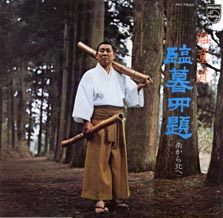- Watazumi Doso
Infobox Buddhist biography
name = Wei Chueh

img_size =
img_capt = "Rinbo Yondai" by Watazumi
landscape =
birth_name =
other_names =
dharma_name =
birth_date = 1910
birth_place =Japan
death_date =December 14 ,1992
death_place =
nationality = Japanese
denomination =
school =Fuke
lineage =
title =Roshi
workplace =
education =
occupation =
teacher =
reincarnation_of =
predecessor =
successor =
student =
spouse =
partner =
children =
website =Watazumi Doso (海童道祖) Roshi (
1910 -December 14 ,1992 ) was a master of the end-blownJapan esebamboo flute. He studied RinzaiZen , attaining the title ofroshi . In the 1950s, Watazumi assembled the DokyokuHonkyoku repertoire of pieces.Watazumi played the unlacquered
hocchiku , in contrast with the modernshakuhachi , stressing that to truly understand nature and oneself, one had to use an instrument of the most raw and natural origin. This belief inspired him to create and lead theWatazumi-do (or "Way of Watazumi") school of spiritual discipline. He frequently performed on quite large bass instruments. Watazumi was also referred to as Watazumi-do Shuso (also spelled Watazumido Shuso or Watazumido-Shuso), "shuso" meaning "head student," a Zen term referring to the student selected by the Zen master to instruct the other students.In addition to the hocchiku, Watazumi used and recommended the Jo stick for exercise, invigoration, and strengthening.
Quotations
* "It's fine that you are all deep into music. But there's something deeper and if you would go deeper, if you go to the source of where the music is being made, you'll find something even more interesting. At the source, everyone's individual music is made. If you ask what the deep place is, it's your own life and it's knowing your own life, that own way that you live."
* "When you hear some music or hear some sound, if for some reason you like it very well; the reason is that sound is in balance or in harmony with your pulse. And so making a sound, you try to make various different sounds that imitate various different sounds of the universe, but what you are finally making is your own sound, the sound of yourself."
* "He who blows Ro 10 minutes every day can become a master."Filmography
*"Sukiyaki and Chips: The Japanese Sounds of Music". Produced and directed by
Jeremy Marre . AHarcourt Films production forChannel Four .ee also
*
Buddhism in Japan
*Yokoyama Katsuya (famous student of Watazumi Doso Roshi)
*Fuke Zen
*List of Rinzai Buddhists
*The Sacrifice : A Swedish film (1986) directed byAndrei Tarkovsky .External links
* [http://www.komuso.com/people/Watazumi_Doso_Roshi.html Watazumi biography and recordings] at [http://www.komuso.com The International Shakuhachi Society web site]
Wikimedia Foundation. 2010.
